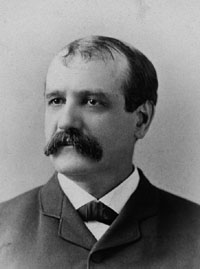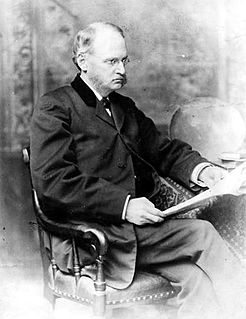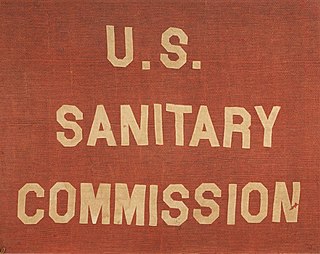Related Research Articles

The Confederate States of America (CSA), commonly referred to as the Confederate States, Dixie, or simply the Confederacy, was an unrecognized breakaway republic in North America that existed from February 8, 1861, to May 9, 1865. The Confederacy comprised U.S. states that declared secession and warred against the United States during the ensuing American Civil War. Eleven U.S. states declared secession from the Union and formed the main part of the CSA. They were South Carolina, Mississippi, Florida, Alabama, Georgia, Louisiana, Texas, Virginia, Arkansas, Tennessee, and North Carolina. Kentucky and Missouri also had declarations of secession and full representation in the Confederate Congress during their Union army occupation.
The Morrill Tariff was an increased import tariff in the United States that was adopted on March 2, 1861, during the administration of US President James Buchanan, a Democrat. It was the twelfth of the seventeen planks in the platform of the incoming Republican Party, which had not yet been inaugurated, and the tariff appealed to industrialists and factory workers as a way to foster rapid industrial growth.

During the American Civil War, the Union, also known as the North, referred to the United States led by President Abraham Lincoln. It was opposed by the secessionist Confederate States of America (CSA), informally called "the Confederacy" or "the South". The Union is named after its declared goal of preserving the United States as a constitutional union. "Union" is used in the U.S. Constitution to refer to the founding formation of the people, and to the states in union. In the context of the Civil War, it has also often been used as a synonym for "the northern states loyal to the United States government;" in this meaning, the Union consisted of 20 free states and five border states.
The Long Depression was a worldwide price and economic recession, beginning in 1873 and running either through March 1879, or 1896, depending on the metrics used. It was most severe in Europe and the United States, which had been experiencing strong economic growth fueled by the Second Industrial Revolution in the decade following the American Civil War. The episode was labeled the "Great Depression" at the time, and it held that designation until the Great Depression of the 1930s. Though a period of general deflation and a general contraction, it did not have the severe economic retrogression of the Great Depression.

The Knights of the Golden Circle (KGC) was a secret society founded in 1854 by American George W. L. Bickley, the objective of which was to create a new country, known as the Golden Circle, where slavery would be legal. The country would have been centered in Havana and would have consisted of the Southern United States and a "golden circle" of territories in Mexico, Central America, northern parts of South America, and Cuba, Haiti, Dominican Republic, most other islands in the Caribbean, about 2,400 miles (3,900 km) in diameter.

Francis Amasa Walker was an American economist, statistician, journalist, educator, academic administrator, and an officer in the Union Army.

William Henry Hunt was the 29th United States Secretary of the Navy, Minister to the Russian Empire and a Judge of the Court of Claims.
The most common name for the American Civil War in modern American usage is simply "The Civil War". Although rarely used during the war, the term "War Between the States" became widespread afterward in the Southern United States. During and immediately after the war, Northern historians often used the terms "War of the Rebellion" and "Great Rebellion", and the Confederate term was "War for Southern Independence", which regained some currency in the 20th century but has again fallen out of use. The name "Slaveholders' Rebellion" was used by Frederick Douglass and appears in newspaper articles. Also in the 20th century, the term "War of Northern Aggression" developed under the Lost Cause of the Confederacy movement by Southern history revisionists, with attempts to reimagine the American Civil War narrative negatively and to preserve Confederate legacy. "Freedom War" is used to celebrate the war's effect of ending slavery. In several European languages, the war is called "War of Secession".

David Ames Wells was an American engineer, textbook author, economist and advocate of low tariffs.

Solomon Foot was an American politician and attorney. He held numerous offices during his career, including Speaker of the Vermont House of Representatives, State's Attorney for Rutland County, member of the United States House of Representatives, and United States Senator.

Thomas Alexander Scott was an American businessman, railroad executive, and industrialist. In 1861, President Abraham Lincoln appointed him to serve as U.S. Assistant Secretary of War, and during the American Civil War railroads under his leadership played a major role in the war effort. He became the fourth president of the Pennsylvania Railroad (1874–1880), which became the largest publicly traded corporation in the world and received much criticism for his conduct in the Great Railroad Strike of 1877 and as a "robber baron." Scott helped negotiate the Republican Party's Compromise of 1877 with the Democratic Party; it settled the disputed presidential election of 1876 in favor of Rutherford B. Hayes in exchange for the federal government pulling out its military forces from the South and ending the Reconstruction era. In his final years, Scott made large donations to the University of Pennsylvania.

California's involvement in the American Civil War included sending gold east to support the war effort, recruiting volunteer combat units to replace regular U.S. Army units sent east, in the area west of the Rocky Mountains, maintaining and building numerous camps and fortifications, suppressing secessionist activity and securing the New Mexico Territory against the Confederacy. The State of California did not send its units east, but many citizens traveled east and joined the Union Army there, some of whom became famous.

The United States Sanitary Commission (USSC) was a private relief agency created by federal legislation on June 18, 1861, to support sick and wounded soldiers of the United States Army during the American Civil War. It operated across the North, raised an estimated $25 million in Civil War era revenue and in-kind contributions to support the cause, and enlisted thousands of volunteers. The president was Henry Whitney Bellows, and Frederick Law Olmsted acted as executive secretary. It was modeled on the British Sanitary Commission, set up during the Crimean War (1853-1856), and from the British parliamentary report published after the Indian Rebellion of 1857.
The Pacific Coast Theater of the American Civil War consists of major military operations in the United States on the Pacific Ocean and in the states and Territories west of the Continental Divide. The theater was encompassed by the Department of the Pacific that included the states of California, Oregon, and Nevada, the territories of Washington, Utah, and later Idaho.

Charles Tillinghast James was a consulting manufacturing engineer, early proponent of steam mills, and United States Democratic Senator from the state of Rhode Island from 1851 to 1857.

Indiana, a state in the Midwest, played an important role in supporting the Union during the American Civil War. Despite anti-war activity within the state, and southern Indiana's ancestral ties to the South, Indiana was a strong supporter of the Union. Indiana contributed approximately 210,000 Union soldiers, sailors, and marines. Indiana's soldiers served in 308 military engagements during the war; the majority of them in the western theater, between the Mississippi River and the Appalachian Mountains. Indiana's war-related deaths reached 25,028. Its state government provided funds to purchase equipment, food, and supplies for troops in the field. Indiana, an agriculturally rich state containing the fifth-highest population in the Union, was critical to the North's success due to its geographical location, large population, and agricultural production. Indiana residents, also known as Hoosiers, supplied the Union with manpower for the war effort, a railroad network and access to the Ohio River and the Great Lakes, and agricultural products such as grain and livestock. The state experienced two minor raids by Confederate forces, and one major raid in 1863, which caused a brief panic in southern portions of the state and its capital city, Indianapolis.

Thomas Worcester Hyde was an American Union Army colonel, a state senator from Maine, and the founder of the Bath Iron Works, one of the major shipyards in the United States. He wrote two books about his experiences during the American Civil War and at the Battle of Gettysburg.

Samuel Jameson Gholson was a United States Representative from Mississippi, a United States District Judge of the United States District Court for the Northern District of Mississippi and the United States District Court for the Southern District of Mississippi and a General in the Confederate States Army.
The Battle of Mathias Point, Virginia was an early naval action of the American Civil War in connection with the Union blockade and the corresponding effort by the Confederates to deny use of the Potomac to the enemy.